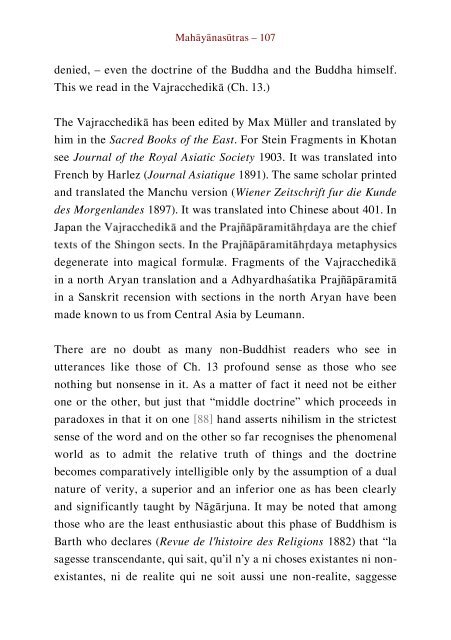Literary History of Sanskrit Buddhism
A study by J. K. Nariman of Sanskrit Buddhism from the Early Buddhist Tradition up to the Mahayana texts proper.
A study by J. K. Nariman of Sanskrit Buddhism from the Early Buddhist Tradition up to the Mahayana texts proper.
Create successful ePaper yourself
Turn your PDF publications into a flip-book with our unique Google optimized e-Paper software.
Mahāyānasūtras – 107<br />
denied, – even the doctrine <strong>of</strong> the Buddha and the Buddha himself.<br />
This we read in the Vajracchedikā (Ch. 13.)<br />
The Vajracchedikā has been edited by Max Müller and translated by<br />
him in the Sacred Books <strong>of</strong> the East. For Stein Fragments in Khotan<br />
see Journal <strong>of</strong> the Royal Asiatic Society 1903. It was translated into<br />
French by Harlez (Journal Asiatique 1891). The same scholar printed<br />
and translated the Manchu version (Wiener Zeitschrift fur die Kunde<br />
des Morgenlandes 1897). It was translated into Chinese about 401. In<br />
Japa<br />
degenerate into magical formulæ. Fragments <strong>of</strong> the Vajracchedikā<br />
in a north Aryan translation and a Adhyardhaśatika Prajñāpāramitā<br />
in a <strong>Sanskrit</strong> recension with sections in the north Aryan have been<br />
made known to us from Central Asia by Leumann.<br />
There are no doubt as many non-Buddhist readers who see in<br />
utterances like those <strong>of</strong> Ch. 13 pr<strong>of</strong>ound sense as those who see<br />
nothing but nonsense in it. As a matter <strong>of</strong> fact it need not be either<br />
one or the other, but just that “middle doctrine” which proceeds in<br />
paradoxes in that it on one [88] hand asserts nihilism in the strictest<br />
sense <strong>of</strong> the word and on the other so far recognises the phenomenal<br />
world as to admit the relative truth <strong>of</strong> things and the doctrine<br />
becomes comparatively intelligible only by the assumption <strong>of</strong> a dual<br />
nature <strong>of</strong> verity, a superior and an inferior one as has been clearly<br />
and significantly taught by Nāgārjuna. It may be noted that among<br />
those who are the least enthusiastic about this phase <strong>of</strong> <strong>Buddhism</strong> is<br />
Barth who declares (Revue de l'histoire des Religions 1882) that “la<br />
sagesse transcendante, qui sait, qu’il n’y a ni choses existantes ni nonexistantes,<br />
ni de realite qui ne soit aussi une non-realite, saggesse


















